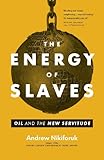The energy of slaves : oil and the new servitude / Andrew Nikiforuk.
Material type: TextPublication details: Vancouver, British Columbia ; Berkeley [Calif.] : Greystone Books ; Vancouver, BC : David Suzuki Foundation ; 2012.Description: xii, 282 p. ; 23 cmISBN:
TextPublication details: Vancouver, British Columbia ; Berkeley [Calif.] : Greystone Books ; Vancouver, BC : David Suzuki Foundation ; 2012.Description: xii, 282 p. ; 23 cmISBN: - 9781553659785 (cloth)
- 9781553659792 (ebook)
- Oil and the new servitude
- HD 9560.6 N692e 2012
| Item type | Current library | Home library | Collection | Shelving location | Call number | Vol info | Copy number | Status | Date due | Barcode |
|---|---|---|---|---|---|---|---|---|---|---|
 Libro
Libro
|
Biblioteca Juan Bosch | Biblioteca Juan Bosch | Ciencias Sociales | Ciencias Sociales (3er. Piso) | HD 9560.6 N692e 2012 (Browse shelf(Opens below)) | 1 | 1 | Available | 00000116601 |
Includes bibliographical references (pages 250-269) and index.
The energy of slaves -- Slaves to energy -- The oil pioneer -- The new servitude -- The unsettling of agriculture -- The Viagra of the species -- The urban fire -- The economist's delusion -- Peak science -- The petrostate -- The surplus devolution -- Oil and happiness -- Japan and the fragility of the petroleum age.
By the winner of the Rachel Carson Environment Book Award. Ancient civilizations relied on shackled human muscle. It took the energy of slaves to plant crops, clothe emperors, and build cities. Nineteenth-century slaveholders viewed critics as hostilely as oil companies and governments now regard environmentalists. Yet the abolition movement had an invisible ally: coal and oil. As the world's most versatile workers, fossil fuels replenished slavery's ranks with combustion engines and other labor-saving tools. Since then, cheap oil has transformed politics, economics, science, agriculture, and ...


There are no comments on this title.